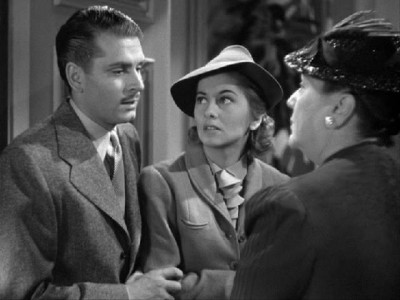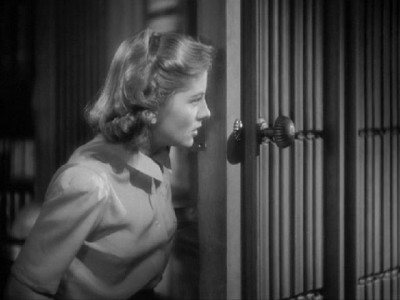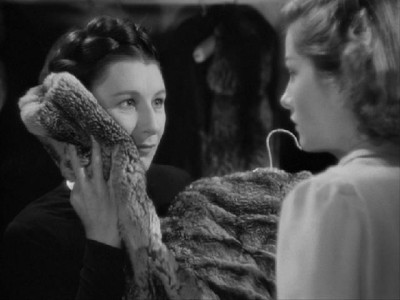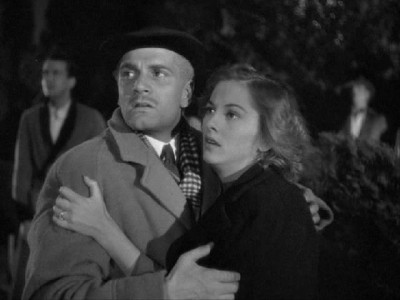
“Last night I dreamt I went to Manderley again.” Those words open the Daphne Du Maurier novel, Rebecca, and they also are the first words you hear on the soundtrack of producer David O. Selznick’s “picturization” (that’s what the credits call it) of the book. These words also clue you in on how the film will try to emulate the book. The film, of course, is famous for being Alfred Hitchcock’s American directorial debut, as well as his only film to win a Best Picture Oscar (though not one for Hitch). It is also the film that finally propelled Joan Fontaine to honest-to-Hollywood stardom as the second Mrs. DeWinter.

All of these things are understandable. And it’s just as understandable why Hitchcock told François Truffaut in an interview that it wasn’t a “Hitchcock picture.” Oh, it’s a good movie — a kind of immensely satisfying banquet of finely-crafted melodramatic gothic romance with some wonderful plot twists and shifts that make you frequently rethink everything you think you know. It’s also a film with Hitchcock’s fingerprints all over it, but those prints are clearly smudged by Selznick’s often-overbearing input and his tendency to make films longer than they needed to be as some weird mark of quality. (This was a legacy of Gone with the Wind that he rarely got over.)

There are scenes in the film where Hitchcock obviously is having a field day enjoying the greater technical aspects Hollywood filmmaking afforded him. The opening shots with his beloved model work well, and a sinuously gliding camera is miles ahead — technically — of any film he could have done in England. The production values are beyond anything he could ever have imagined. He takes to the studio recreation of England and English life like your proverbial duck to water. In many ways, he seems to be echoing the work of another Brit in Hollywood, James Whale, who had created an illusion of England that felt more real than the real thing six years earlier in One More River. The sometimes shaky traveling shots of Hitch’s British films are here replaced with unwavering tracking shots — that he can’t seem to get enough of. It’s a lot of fun to watch him, but how involved Hitch really was in meticulously detailed story of Maxim DeWinter (Laurence Olivier) and his frankly rather goopy bride (Fontaine) — well, that’s another matter.

Hitchcock was too good a showman — and certainly too clever — not to make his first Hollywood film a hit, and to let the film be anything other than meticulous. The story is well-crafted, though even Hitch can’t keep Fontaine’s scared rabbit performance from growing a little tiresome (the movie is more than half over by the time she shows any backbone whatever). It takes even longer — not till the big revelation — before Olivier is allowed to demonstrate more than a fleeting hint of being an utter stiff. (This is pretty much inherent in the material.) Hitchcock’s interest seems far more engaged — understandably so — by Judith Anderson’s Mrs. Danvers, the plainly demented housekeeper who was devoted to the titular Rebecca. That he managed to get away with depicting her devotion as a barely repressed lesbian obsession with her late mistress is a marvel of hoodwinking the censors. (The role is so good that Cornelia Otis Skinner’s Miss Holloway in Lewis Allen’s 1944 ghost story The Uninvited is little more than a stylish variation on it. For that matter, other elements of The Uninvited owe much to this film.)

Don’t get me wrong, Rebecca is good — and it’s enough of a Hitchcock film in touches and style that it does belong in his main body of work. On its own merits as entertainment and as a glossy “picturizatiion” of an immensely popular novel, it’s a movie that’s hard to fault. That it landed Hitchcock in a realm where almost anything was possible—away from the limitations of the British studios of the era was certainly a plus. But for all that, I’d still take the best of his British films and his second American film, Foreign Correspondent (also 1940), over it any day of the week. Others will undoubtedly feel differently.
The Hendersonville Film Society will show Rebecca Sunday, Jan. 5, at 2 p.m. in the Smoky Mountain Theater at Lake Pointe Landing Retirement Community (behind Epic Cinemas), 333 Thompson St., Hendersonville.



Before you comment
The comments section is here to provide a platform for civil dialogue on the issues we face together as a local community. Xpress is committed to offering this platform for all voices, but when the tone of the discussion gets nasty or strays off topic, we believe many people choose not to participate. Xpress editors are determined to moderate comments to ensure a constructive interchange is maintained. All comments judged not to be in keeping with the spirit of civil discourse will be removed and repeat violators will be banned. See here for our terms of service. Thank you for being part of this effort to promote respectful discussion.